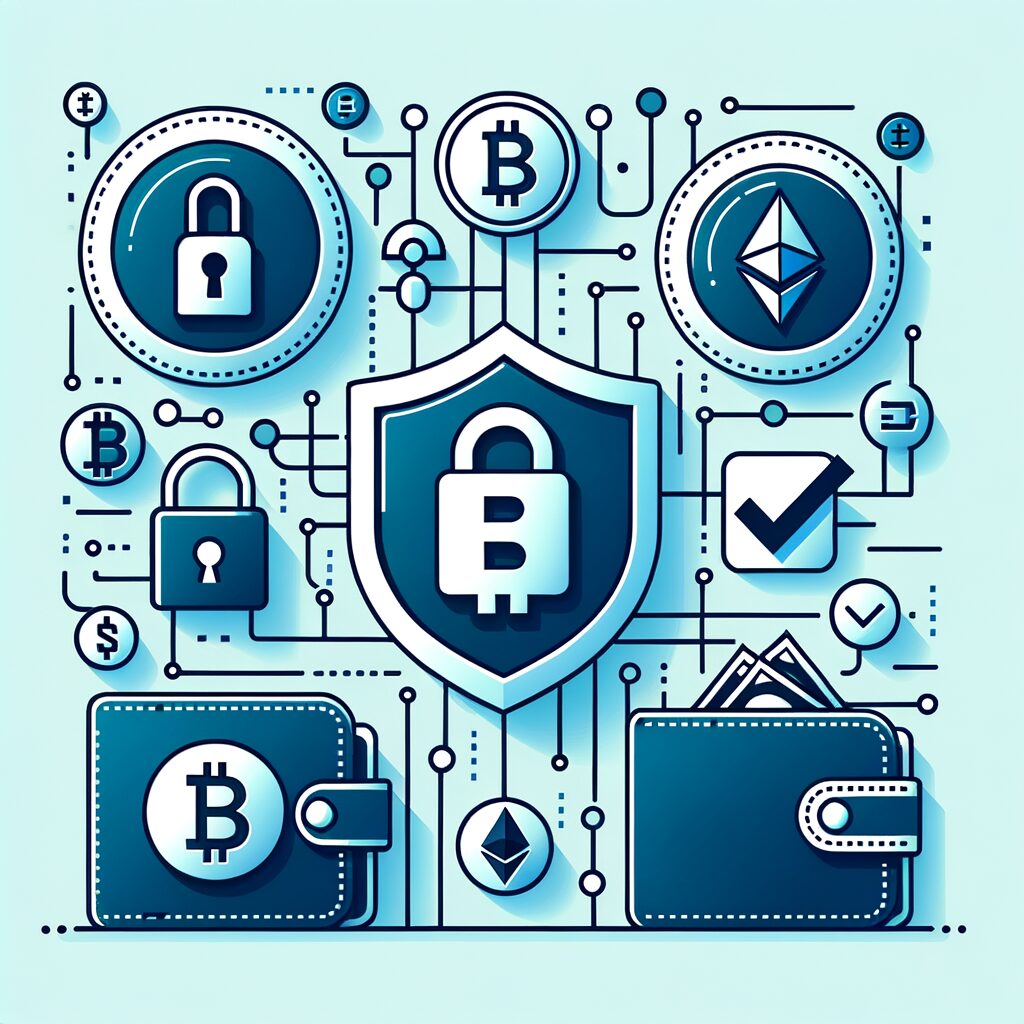
“Fortify Your Funds: Mastering Crypto Wallet Security for Unbreachable Asset Protection.”
Crypto Wallet Security: Essential Steps to Protect Your Digital Assets
Crypto Wallet Security: Best Practices for Safeguarding Your Digital Assets
In the burgeoning world of cryptocurrency, the security of digital assets is paramount. As the value and utility of cryptocurrencies like Bitcoin, Ethereum, and others have skyrocketed, so too has the interest of cybercriminals looking to exploit vulnerabilities. Therefore, it is crucial for individuals to adopt stringent security measures to protect their investments. This article outlines essential steps and best practices for safeguarding your digital assets.
First and foremost, understanding the types of crypto wallets available is key to choosing the right one for your needs. Hot wallets, which are connected to the internet, offer convenience for frequent transactions but are more susceptible to online threats. Conversely, cold wallets are offline storage options, such as hardware wallets or paper wallets, that provide an additional layer of security against cyber-attacks. For optimal protection, it is advisable to use a combination of both, storing the bulk of assets in a cold wallet and maintaining a smaller balance in a hot wallet for everyday transactions.
Once you have selected an appropriate wallet, the next step is to secure your private keys. These keys are the gateway to your funds, and if they fall into the wrong hands, your assets could be irretrievably lost. It is imperative to never share your private keys with anyone and to store them in a secure location. Writing them down and keeping them in a safe or a safety deposit box can prevent digital theft and ensure that you have access to your assets even if your electronic devices fail.
Another critical aspect of crypto wallet security is the use of strong, unique passwords and two-factor authentication (2FA). Passwords should be complex, containing a mix of letters, numbers, and symbols, and should be changed regularly. Enabling 2FA adds an extra layer of security, typically requiring a code from a mobile device in addition to the password to access the wallet. This makes it significantly more difficult for unauthorized users to gain access to your funds.
Regularly updating software is also an essential practice for maintaining wallet security. Wallet providers frequently release updates to patch vulnerabilities and enhance security features. By keeping your wallet software and any associated applications up to date, you can protect yourself against known exploits that hackers might use to infiltrate your wallet.
Moreover, it is wise to be vigilant against phishing attempts and other forms of social engineering. Cybercriminals often use deceptive emails, messages, or websites to trick individuals into revealing sensitive information. Always verify the authenticity of any communication or website before entering your private keys or wallet credentials. Remember, legitimate companies will never ask for your private keys.
Lastly, consider using multi-signature wallets, which require multiple approvals before transactions can be completed. This feature is particularly useful for businesses or individuals who want to add an extra layer of consensus to their security protocols, thereby reducing the risk of theft or unauthorized access.
In conclusion, the security of your crypto wallet should never be taken lightly. By carefully selecting the right type of wallet, safeguarding your private keys, employing strong passwords and 2FA, keeping software up to date, staying alert to phishing scams, and considering multi-signature technology, you can significantly reduce the risk of losing your digital assets to cybercriminals. As the crypto landscape continues to evolve, staying informed and adopting these best practices will help ensure that your investments remain secure.
Digital Asset Protection: Implementing Wallet Best Practices for Maximum Security

Crypto Wallet Security: Best Practices for Safeguarding Your Digital Assets
In the burgeoning world of cryptocurrency, the security of digital assets is paramount. As the interface between users and their blockchain-based assets, crypto wallets are the custodians of private keys that are essential for accessing cryptocurrencies. Therefore, implementing wallet best practices is not just recommended; it is a critical necessity for anyone looking to safeguard their digital wealth.
First and foremost, understanding the types of wallets available is crucial for making informed decisions about security. Hot wallets, which are connected to the internet, offer convenience but are more susceptible to online threats. Conversely, cold wallets, such as hardware or paper wallets, store private keys offline, providing a robust defense against cyber-attacks. For maximum security, it is advisable to use cold wallets for the bulk of one's holdings, while reserving hot wallets for daily transactions.
Moreover, the practice of employing strong, unique passwords cannot be overstressed. Passwords should be complex, containing a mix of letters, numbers, and symbols, and they should be changed regularly. Additionally, wallet users should never reuse passwords across different platforms or services, as this increases vulnerability to cyber threats.
Another layer of security that is becoming a standard is two-factor authentication (2FA). This requires a second form of verification, such as a text message or an authentication app, in addition to the password. This method significantly reduces the risk of unauthorized access, as an attacker would need to compromise both factors to gain entry.
Equally important is the regular backup of wallet data. Backups should be stored in multiple secure locations, and for cold wallets, this means physically securing the storage medium. It is also essential to encrypt backup data to prevent unauthorized access in the event of theft or loss. Users should test their backups periodically to ensure they can recover their wallets if necessary.
Furthermore, keeping software up to date is a simple yet effective security measure. Wallet software updates often contain patches for security vulnerabilities that have been discovered since the last version. By staying current with updates, users can protect themselves against known exploits that hackers might use to gain unauthorized access to their wallets.
Phishing attacks are a common tactic used by cybercriminals to trick individuals into revealing sensitive information. Wallet users should be vigilant about the sources of their communications. They should verify the authenticity of emails, websites, and social media messages claiming to be from their wallet provider or related services. It is a good practice to directly navigate to the official website rather than clicking on links in emails or messages.
Lastly, education is a powerful tool in the fight against cyber threats. Staying informed about the latest security risks and trends in the crypto space can help individuals anticipate and prepare for potential threats. Joining reputable crypto communities and following trusted security experts can provide valuable insights and timely warnings about emerging vulnerabilities.
In conclusion, the security of crypto wallets is not a matter to be taken lightly. By employing a combination of strong passwords, two-factor authentication, regular backups, software updates, vigilance against phishing, and ongoing education, individuals can significantly enhance the security of their digital assets. As the crypto landscape evolves, so too must the strategies for protecting it. By implementing these best practices, users can create a formidable barrier against the myriad of threats that loom in the digital realm, ensuring that their assets remain secure and under their control.
Secure Storage Solutions: How to Keep Your Crypto Wallet Safe from Threats
Crypto Wallet Security: Best Practices for Safeguarding Your Digital Assets
In the burgeoning world of cryptocurrency, the security of digital assets is paramount. As the interface that allows users to manage their cryptocurrencies, a crypto wallet's integrity is crucial. With the rise of cyber threats, it is essential to adopt secure storage solutions and best practices to ensure the safety of your digital wealth.
First and foremost, understanding the types of wallets available is key to choosing the right security measures. Hot wallets, which are connected to the internet, offer convenience but are more susceptible to online threats. Conversely, cold wallets are offline and provide a higher level of security against digital attacks. For the utmost security, many opt for hardware wallets, which are physical devices that store private keys offline.
The foundation of crypto wallet security lies in the safeguarding of private keys—the alphanumeric strings that grant access to your assets. It is imperative to keep these keys confidential and to never share them with anyone. Writing down the private key and storing it in a secure location, such as a safe deposit box, can prevent loss due to computer failure or hacking. Additionally, using a strong, unique passphrase for your wallet can significantly reduce the risk of unauthorized access.
Another critical aspect of wallet security is the regular backup of your wallet's data. In the event of device failure or loss, having an up-to-date backup will allow you to recover your assets. This backup should be stored on a separate device or physical medium and kept in a secure location, separate from your primary wallet.
Moreover, staying updated with the latest software is a vital security practice. Wallet developers frequently release updates to patch vulnerabilities and enhance functionality. By keeping your wallet software up-to-date, you can protect yourself against known exploits that hackers might use to gain unauthorized access to your funds.
Phishing attacks are a common threat to crypto wallet security. These scams trick individuals into revealing sensitive information by masquerading as trustworthy entities. To combat this, always verify the authenticity of any communication claiming to be from your wallet provider. Be wary of unsolicited messages or emails that request private keys or personal information.
In addition to these measures, consider using multi-signature wallets, which require multiple private keys to authorize a transaction. This feature adds an extra layer of security by distributing the risk and making it more difficult for unauthorized users to move funds.
Furthermore, the use of two-factor authentication (2FA) can provide an additional safeguard. This security feature requires a second form of verification, such as a code sent to your mobile device, before allowing access to the wallet or confirming transactions. It is a simple yet effective way to deter potential intruders.
Lastly, it is crucial to stay informed about the latest security threats and trends in the cryptocurrency space. By being aware of new risks and actively engaging with the crypto community, you can adopt proactive measures to protect your assets.
In conclusion, the security of your crypto wallet should never be taken lightly. By employing a combination of secure storage solutions, such as using hardware wallets and keeping private keys confidential, regularly backing up your data, updating software, avoiding phishing scams, utilizing multi-signature and 2FA features, and staying informed, you can significantly reduce the risk of losing your digital assets to cyber threats. As the crypto landscape evolves, so too should your security strategies, ensuring that your investments remain protected now and in the future.
Enhancing Your Crypto Wallet Security: Techniques for Safeguarding Your Digital Investments
Crypto Wallet Security: Best Practices for Safeguarding Your Digital Assets
In the burgeoning world of cryptocurrency, the security of digital wallets is paramount. As the repository for digital currencies, these wallets are the gatekeepers of one's investments, and their security is as crucial as that of a traditional bank account. With the rise of cyber threats, it is imperative for individuals to adopt robust security measures to protect their digital assets from unauthorized access and potential loss.
First and foremost, understanding the types of wallets available is essential. Hot wallets, which are connected to the internet, offer convenience but are more susceptible to online threats. Conversely, cold wallets are offline storage options that provide enhanced security by being less accessible to hackers. For optimal protection, it is advisable to store the bulk of digital assets in cold wallets, using hot wallets for daily transactions with limited funds.
The strength of a wallet's security is often as strong as its weakest link, which in many cases is the password. Utilizing complex and unique passwords is a fundamental step in safeguarding wallets. Password managers can assist in generating and storing strong passwords, reducing the risk of using predictable or repeated passwords across different platforms. Additionally, changing passwords regularly and never sharing them with others is a critical practice.
Another layer of defense is two-factor authentication (2FA), which adds an extra step to the login process, typically requiring a code sent to a mobile device or generated by an authenticator app. This method ensures that even if a password is compromised, unauthorized users cannot gain access without the second form of verification.
Phishing attacks are a common tactic used by cybercriminals to trick individuals into revealing sensitive information. Being vigilant about the sources of emails, messages, and websites that request wallet credentials is vital. Always verify the authenticity of communication and never click on suspicious links or download attachments from unknown sources.
Regularly updating wallet software is another critical practice. Developers continuously work to improve wallet security by patching vulnerabilities and enhancing features. Keeping the wallet software up to date ensures that one benefits from the latest security measures.
Backing up the wallet is an often-overlooked yet essential aspect of crypto wallet security. In the event of device failure, theft, or loss, having a backup allows for the restoration of the wallet and its contents. This backup should be stored in a secure location, such as an encrypted drive or a safety deposit box, and should include not only the wallet's data but also any recovery phrases or private keys.
Speaking of private keys, they are the ultimate access to one's digital assets and should be treated with the utmost care. Never store private keys on internet-connected devices or online platforms. Writing them down and storing them in multiple secure locations can prevent loss due to a single point of failure.
Lastly, educating oneself about the latest security threats and staying informed about best practices in the industry is an ongoing process. The landscape of cybersecurity is ever-evolving, and staying ahead of potential threats is key to safeguarding one's investments.
In conclusion, the security of crypto wallets should never be taken lightly. By employing a combination of strong passwords, two-factor authentication, vigilance against phishing, regular updates, secure backups, careful handling of private keys, and continuous education, individuals can significantly enhance the security of their digital wallets. As the adage goes, an ounce of prevention is worth a pound of cure, and in the realm of digital assets, this could not be truer.


